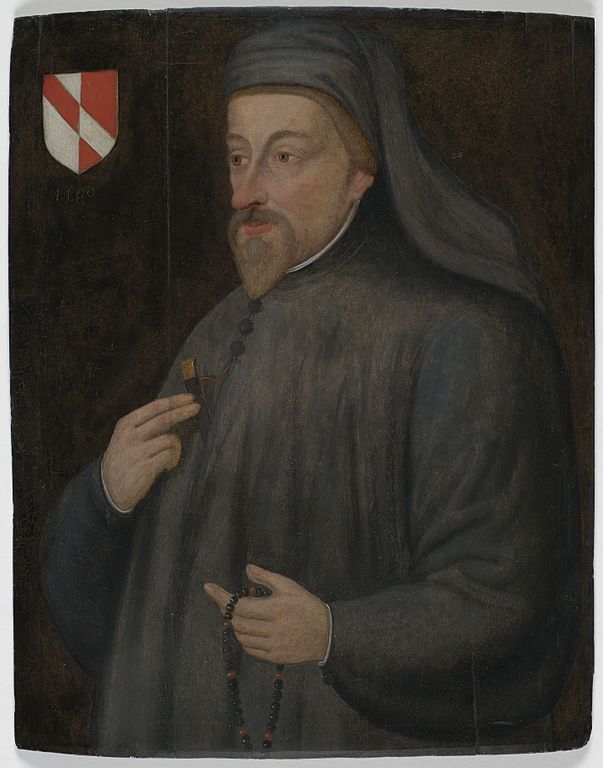
(Wikimedia Commons public domain)
I’ve just undertaken a project to slog gradually through Geoffrey Chaucer’s Canterbury Tales in the original Middle English. I’ve always intended to do it and, finally, I’ve made a start. I was really struck by a passage in the Prologue describing a rather worldly frere or friar that, I would guess, was modeled on actual fourteenth-century friars known to Chaucer, who was an acute observer of the social world around him. I won’t generalize, of course, to say that all of the friars of his day were similar, but the type must have been recognizable to Chaucer’s audience.
First, though, a small handful of notes that might help:
- A frere or “friar” was a member of one of the four mendicant orders of late medieval Catholicism (the Augustinians, Carmelites, Dominicans, and Franciscans).
- A lymytour or “limiter” was an itinerant and begging friar employed by a convent to travel within certain geographical limits in order to collect its dues and promote its temporal interests.
- To shrive was to hear the confession of, to assign penance to, and to absolve (someone).
- A frankelyn or “franklin” was a prosperous but non-noble landowner.
- In the Latin Vulgate translation of the Bible, the opening words of the Gospel of John and of Genesis are in principio (“in the beginning”).
So here is Chaucer’s original verse, lines 208-269 of the Prologue:
A Frere ther was, a wantowne and a merye,A lymytour, a ful solémpne man.In alle the ordres foure is noon that kanSo muchel of daliaunce and fair langage.He hadde maad ful many a mariageOf yonge wommen at his owene cost.Unto his ordre he was a noble post.Ful wel biloved and famulier was heWith frankeleyns over al in his contree,And eek with worthy wommen of the toun;For he hadde power of confessioun,As seyde hym-self, moore than a curát,For of his ordre he was licenciat.Ful swetely herde he confessioun,And plesaunt was his absolucioun.He was an esy man to yeve penaunceThere as he wiste to have a good pitaunce;For unto a povre ordre for to yiveIs signe that a man is wel y-shryve;For, if he yaf, he dorste make avauntHe wiste that a man was répentaunt;For many a man so hard is of his herteHe may nat wepe al-thogh hym soore smerte.Therfore in stede of wepynge and preyéresMen moote yeve silver to the povre freres.His typet was ay farsed full of knyvesAnd pynnes, for to yeven faire wyves.And certeinly he hadde a murye note:Wel koude he synge and pleyen on a rote;Of yeddynges he baar outrely the pris.His nekke whit was as the flour-de-lys;Ther-to he strong was as a champioun.He knew the tavernes wel in every toun,And everich hostiler and tappestereBet than a lazar or a beggestere;For unto swich a worthy man as heAcorded nat, as by his facultee,To have with sike lazars aqueyntaunce;It is nat honest, it may nat avaunceFór to deelen with no swich poraille,But al with riche and selleres of vitaille.And over-al, ther as profit sholde arise,Curteis he was and lowely of servyse.Ther nas no man nowher so vertuous.He was the beste beggere in his hous;[And yaf a certeyn ferme for the graunt,Noon of his brethren cam ther in his haunt;]For thogh a wydwe hadde noght a sho,So plesaunt was his In principio,Yet wolde he have a ferthyng er he wente:His purchas was wel bettre than his rente.And rage he koude, as it were right a whelpe.In love-dayes ther koude he muchel helpe,For there he was nat lyk a cloystererWith a thredbare cope, as is a povre scolér,But he was lyk a maister, or a pope;Of double worstede was his semycope,That rounded as a belle, out of the presse.Somwhat he lipsed for his wantownesse,To make his Englissh sweete upon his tonge;And in his harpyng, whan that he hadde songe,His eyen twynkled in his heed aryghtAs doon the sterres in the frosty nyght.This worthy lymytour was cleped Hubérd.
And here is a translation into modern English of those same verses, published by A. S. Kline in 2007:
A FRIAR there was, a wanton one and merry,A Limiter, a very jovial man.In all the friars’ four orders none that canLead a discussion in fairer language.And he had arranged many a marriageOf young women, granting each a dower.He was a noble pillar of his Order.Well-beloved and intimate was heWith Franklins within his boundary,And also worthy women of the town;Had power to confess coat and gown –As he said himself – more than a curate,Having licence from his bishop to do it.Full sweetly he would hear confessions,And very pleasant were his absolutions.He was an easy man at granting penanceFrom which he made more than a pittance.When to a poor Order alms are givenIt is a token that a man’s well-shriven;Since he dared claim that from the intent,Of giving, then the man was penitent.For many a man is so hard of heartHe cannot weep, though he feels the smart.Therefore instead of weeping and prayer,Better to give the poor friars silverware.His sleeve’s end was stuffed with pocket-knivesAnd gilded pins, to give to pretty wives.He could hold a note for sure; could singAnd play quite sweetly on the tuneful string.Such competitions he won easily.His neck was white as the fleur-de-lis;And he was as strong as any champion.He knew the taverns well in every town,And all the barmaids and innkeepers,Rather than the lepers and the beggarsSince such a worthy man as heIt suited not his calling or degree,With such lepers to maintain acquaintance.It is not seemly – helps no man advance –To have dealings with such poor people,Only with the rich, sellers of victuals.And everywhere a profit might arise,He wore a courteous and humble guise;There was no man half so virtuous.He was the finest beggar of his house– and paid a fixed fee for the right;None of his brethren poached in his sight.For though a widow lacked a shoeSo pleasant was his ‘In principio’,He yet would gain a farthing as he went.His income was far greater than his rent,And he romped around, like any whelp.In settling disputes he could help,Not like a friar from a cloister,With threadbare cloak, like needy scholar,But he was like a doctor or a pope;Of double worsted was his demi-cloak,A bell shaped from the mould, its fashion.He lisped a little out of affectation,To sound his English sweet upon the tongue;And in his harping, whenever he had sung,His eyes would twinkle in his head arightAs do the stars on high in frosty night.Hubert his name, this worthy Limiter.
And it seems that Friar Hubert was prospering by means of his ecclesiastical functions. Chaucer’s description of him, which is plainly more amused than indignant, is a contemporary snapshot of at least one facet of fourteenth-century Christendom.
I can’t help but think of a passage in the Book of Mormon: “Priestcrafts,” says 2 Nephi 26:29, “are that men preach and set themselves up for a light unto the world, that they may get gain and praise of the world; but they seek not the welfare of Zion.”

















